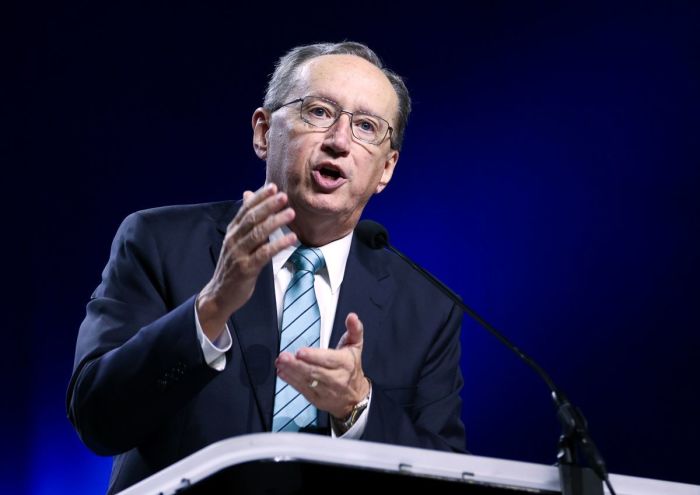
The Southern Baptist Convention failed to pass a motion to prohibit member churches from employing women in any pastor role, a similar measure to the Law Amendment that was narrowly defeated last year.
At the SBC Annual Meeting in Dallas, Texas, the messengers voted on Wednesday afternoon on a motion proposed by Juan Sanchez of High Pointe Baptist Church in Austin, Texas.
The proposed motion sought to amend the SBC Constitution’s Article 3, Paragraph 1 to include a sixth item requiring churches to have “only men as any kind of pastor or elder as qualified by Scripture.”
Although the SBC Baptist Faith and Message 2000 dictates that only men should serve in the office of pastor, the proposed measure clarifies to the SBC Credentials Committee how this standard should be implemented.
The motion failed to receive the necessary two-thirds majority to pass, receiving 3,421 votes in favor, constituting 60.74% of the ballots cast, while also having 2,191 votes against, comprising 38.9% of the ballots cast.
In remarks made before the vote, Sanchez told those gathered that “the aim of this motion is simply to provide help by clarifying what the Baptist Faith and Message already says regarding the office of pastor.”
“We simply hope to provide guidance, further guidance to the Credentials Committee,” he continued. “This is the time for us to clarify what we believe.”
Sanchez rejected the claim that the amendment was going after women in any and all church leadership roles, noting that his church has both male and female deacons.
“The aim of complementarianism is not to limit what women can do in the church, but to actually free them to minister in the church in appropriate roles alongside men,” he added.
Pastor James Goforth of First Baptist Church of Ferguson, Missouri, spoke against the motion, noting that Southern Baptists “believe in the autonomy of local churches,” which results in “allowing us to have some differences of practice while still cooperating together for the Great Commission.”
While opposed to the idea of female senior pastors, Goforth believed that the motion would force the convention “to headhunt a bridge too far” and distract from fighting “the real enemy.”
Instead, Goforth said, SBC churches should “seek to redeem the lost, set prisoners free, declare the year of the Lord’s favor.”
Travis Cardwell, lead pastor of University Park Baptist Church of Houston, Texas, spoke in favor of the motion, believing that the SBC Credentials Committee needed clarity on the issue.
“I, for one, do not wish to come to the convention every year to debate female pastors,” said Cardwell. “If we don’t give them that clarity, then we’re going to have to come back here year after year and debate this indefinitely.”
The Baptist Faith and Message 2000 defines “pastor” as a person “who fulfills the pastoral office and carries out the pastor’s functions,” with Article VI explaining that “the office of pastor is limited to men as qualified by Scripture.”
Named after Pastor Mike Law of Arlington Baptist Church in Virginia, the Law Amendment would have amended the SBC Constitution to clarify that no member church could have a woman serving as an elder or pastor.
While the SBC has disfellowshipped churches for having female lead or teaching pastors, Law had previously estimated that around 1,800 SBC member congregations had women serving as pastors.
At last year’s Annual Meeting in Indianapolis, Indiana, 61% of messengers voted in favor of the Law Amendment, but it fell short of the two-thirds vote needed to be ratified after it was advanced during the 2023 Annual Meeting with about 80% of the vote from over 12,000 messengers in New Orleans.
Denny Burk, an associate professor of biblical studies at Boyce College, the undergraduate arm of the Southern Baptist Theological Seminary, noted on social media that it’s “clear that majorities of messengers at the last three conventions want this amendment.”
“But it is very difficult to get a supermajority to pass a measure when the platform opposes it. The platform mounted strong opposition the last two years,” Burk wrote, objecting to an argument that passing the amendment could lead to lawsuits.
“I thought the amendment had a good chance of reaching a supermajority until the platform warned messengers during the debate that the amendment would put the SBC in legal jeopardy. At that point, it seemed clear to me that we would likely get a majority again but that enough messengers would be scared away to keep the effort from a supermajority. I was right.”
Former SBC President J.D. Greear opposed the Law Amendment, calling the proposal “unwise” and “unnecessary” and warning that it could lead to an exodus of minority churches.
“I remain convictionally opposed to this amendment, not because of its content but because of its attempt to undermine our historic principles of cooperation,” Greear wrote on his website before last year’s vote.
The Texas-based Baptist Women in Ministry, which has members belonging to numerous Baptist denominations, released a statement last year celebrating the failure of the amendment.
“We are grateful to churches and messengers represented at the SBC who came to send the message that women have equal value to God. We know that others voted against the amendment for other reasons, but we hope the message of your support for female pastors will be amplified,” they stated.


















